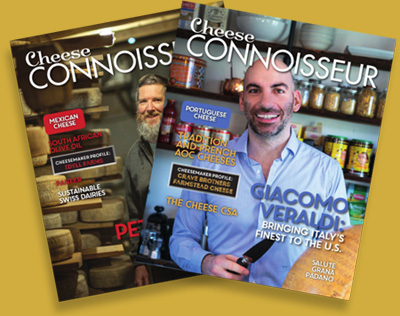As the great grandson of a Swiss-trained cheesemaker, Chris Roelli, co-owner and master cheesemaker at Roelli Cheese Haus, always wondered why his family’s company only produced English-style cheeses.

Determined to flip the script, Roelli, of Shullsburg, WI, set out to create a cheese on a smaller scale but similar to the type his great grandfather made back in Switzerland. Three years later, Little Mountain debuted and just recently was honored with the American Cheese Society’s 2016 Best in Show award.
Roelli visited John Jaeggi, research cheesemaker at the University of Wisconsin-Madison’s Center for Dairy Research, and explained his desired flavor profile. The description sounded like a style similar to Appenzeller, a protected cheese from Switzerland.
Careful not to step on any toes, Roelli began experimenting with different cultures and procedures to get to the desired end product. This included creating five trial batches at the university with five different cultures and variations of adjunct cultures.
He then went back to his company in order to perfect the procedural part of the process, which involved much experimentation, along with trial and error.
“I started with the flavor profile, because I knew the basics of the culture and style of cheese I was looking for, but had to perfect this using my equipment,” says Roelli. Appenzeller is traditionally made in a copper kettle over an open fire, while Roelli utilizes a stainless steel vat with copper utensils and agitator panels to add the tinny flavor Alpine mountain cheese is known for.
Like Appenzeller, Little Mountain is made with simple milk that does not include a lot of culture. It is created with dry salt, rather than the traditional Appenzeller brine, then washed with a blend of cultures similar to a traditional Alpine cheese. The aging process averages seven to eight months, but can be as long as 14 to 18 months.
Little Mountain is distinguished by a sweet, slightly fruity flavor with Swiss nutty overtones. Roelli describes the cheese as a cross between a Gruyère and Emmentaler.
“It gets a lot of grassy fruity notes from the mountains, but still has the nutty characteristics that good Swiss-style cheeses are known for,” says Roelli.
Little Mountain is best served as a table cheese, but can be paired with dried fruit like raisins or figs, as well as honey and apricot jam. Although its flavor is hearty enough to stand up to many beer types, the cheese goes well with both sweeter and dry wines.
In addition to the ACS honors – Little Mountain competed against more than 1,800 entries for the top prize — the cheese has placed in every competition entered. This includes taking third in its first ACS Show in Madison in 2013; securing Best in Class at the Wisconsin State Fair the following year; and a first place win at the U.S. Cheese Championships in 2015.
“When the awards began to accumulate, we knew we were on to something, but there’s something special about winning ACS Best in Show,” says Roelli. “You never expect it.”



